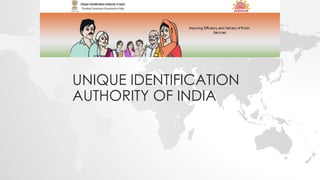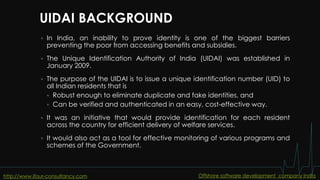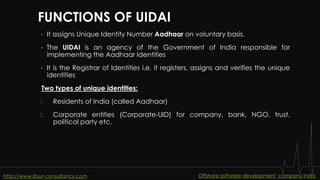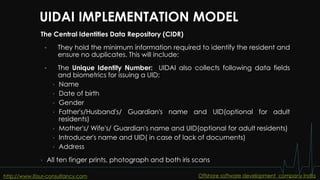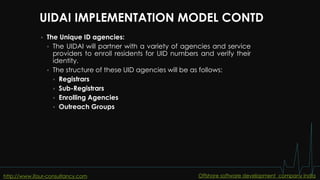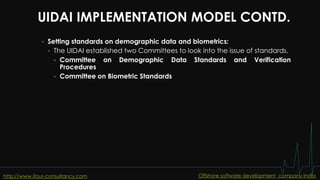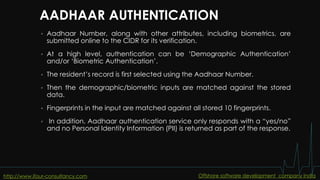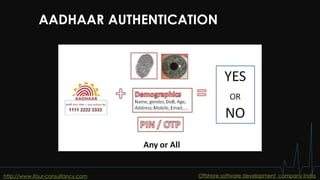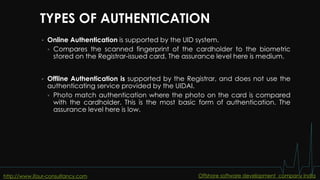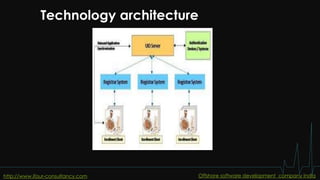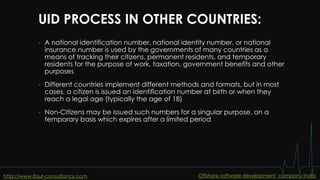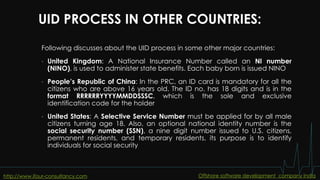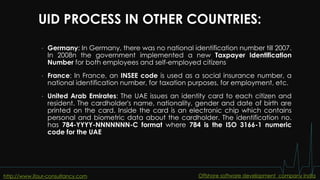Unique identification authority of india uid
- 1. UNIQUE IDENTIFICATION AUTHORITY OF INDIA
- 2. UIDAI BACKGROUND In India, an inability to prove identity is one of the biggest barriers preventing the poor from accessing benefits and subsidies. The Unique Identification Authority of India (UIDAI) was established in January 2009. The purpose of the UIDAI is to issue a unique identification number (UID) to all Indian residents that is Robust enough to eliminate duplicate and fake identities, and Can be verified and authenticated in an easy, cost-effective way. It was an initiative that would provide identification for each resident across the country for efficient delivery of welfare services. It would also act as a tool for effective monitoring of various programs and schemes of the Government. http://www.ifour-consultancy.com Offshore software development company India
- 3. FUNCTIONS OF UIDAI It assigns Unique Identity Number Aadhaar on voluntary basis. The UIDAI is an agency of the Government of India responsible for implementing the Aadhaar Identities It is the Registrar of Identities i.e. it registers, assigns and verifies the unique identities Two types of unique identities: 1. Residents of India (called Aadhaar) 2. Corporate entities (Corporate-UID) for company, bank, NGO, trust, political party etc. http://www.ifour-consultancy.com Offshore software development company India
- 4. UIDAI IMPLEMENTATION MODEL The Central Identities Data Repository (CIDR) They hold the minimum information required to identify the resident and ensure no duplicates. This will include: The Unique Identity Number: UIDAI also collects following data fields and biometrics for issuing a UID: • Name • Date of birth • Gender • Father's/Husband's/ Guardian's name and UID(optional for adult residents) • Mother's/ Wife's/ Guardian's name and UID(optional for adult residents) • Introducer's name and UID( in case of lack of documents) • Address • All ten finger prints, photograph and both iris scans http://www.ifour-consultancy.com Offshore software development company India
- 5. UIDAI IMPLEMENTATION MODEL CONTD The Unique ID agencies: The UIDAI will partner with a variety of agencies and service providers to enroll residents for UID numbers and verify their identity. The structure of these UID agencies will be as follows: Registrars Sub-Registrars Enrolling Agencies Outreach Groups http://www.ifour-consultancy.com Offshore software development company India
- 6. UIDAI IMPLEMENTATION MODEL CONTD. Setting standards on demographic data and biometrics: The UIDAI established two Committees to look into the issue of standards. Committee on Demographic Data Standards and Verification Procedures Committee on Biometric Standards http://www.ifour-consultancy.com Offshore software development company India
- 7. AADHAAR AUTHENTICATION Aadhaar Number, along with other attributes, including biometrics, are submitted online to the CIDR for its verification. At a high level, authentication can be ‘Demographic Authentication’ and/or ‘Biometric Authentication’. The resident’s record is first selected using the Aadhaar Number. Then the demographic/biometric inputs are matched against the stored data. Fingerprints in the input are matched against all stored 10 fingerprints. In addition, Aadhaar authentication service only responds with a “yes/no” and no Personal Identity Information (PII) is returned as part of the response. http://www.ifour-consultancy.com Offshore software development company India
- 8. AADHAAR AUTHENTICATION http://www.ifour-consultancy.com Offshore software development company India
- 9. TYPES OF AUTHENTICATION Online Authentication is supported by the UID system. Compares the scanned fingerprint of the cardholder to the biometric stored on the Registrar-issued card. The assurance level here is medium. Offline Authentication is supported by the Registrar, and does not use the authenticating service provided by the UIDAI. Photo match authentication where the photo on the card is compared with the cardholder. This is the most basic form of authentication. The assurance level here is low. http://www.ifour-consultancy.com Offshore software development company India
- 10. TECHNOLOGY ARCHITECTURE OF THE UIDAI System architecture The UID Server The Biometric sub-system The Enrolment client The Network The Security design http://www.ifour-consultancy.com Offshore software development company India
- 11. Technology architecture http://www.ifour-consultancy.com Offshore software development company India
- 12. UID PROCESS IN OTHER COUNTRIES: • A national identification number, national identity number, or national insurance number is used by the governments of many countries as a means of tracking their citizens, permanent residents, and temporary residents for the purpose of work, taxation, government benefits and other purposes • Different countries implement different methods and formats, but in most cases, a citizen is issued an identification number at birth or when they reach a legal age (typically the age of 18) • Non-Citizens may be issued such numbers for a singular purpose, on a temporary basis which expires after a limited period http://www.ifour-consultancy.com Offshore software development company India
- 13. UID PROCESS IN OTHER COUNTRIES: Following discusses about the UID process in some other major countries: • United Kingdom: A National Insurance Number called an NI number (NINO), is used to administer state benefits. Each baby born is issued NINO • People’s Republic of China: In the PRC, an ID card is mandatory for all the citizens who are above 16 years old. The ID no. has 18 digits and is in the format RRRRRRYYYYMMDDSSSC, which is the sole and exclusive identification code for the holder • United States: A Selective Service Number must be applied for by all male citizens turning age 18. Also, an optional national identity number is the social security number (SSN), a nine digit number issued to U.S. citizens, permanent residents, and temporary residents, its purpose is to identify individuals for social security http://www.ifour-consultancy.com Offshore software development company India
- 14. UID PROCESS IN OTHER COUNTRIES: • Germany: In Germany, there was no national identification number till 2007. In 2008n the government implemented a new Taxpayer Identification Number for both employees and self-employed citizens • France: In France, an INSEE code is used as a social insurance number, a national identification number, for taxation purposes, for employment, etc. • United Arab Emirates: The UAE issues an identity card to each citizen and resident. The cardholder's name, nationality, gender and date of birth are printed on the card. Inside the card is an electronic chip which contains personal and biometric data about the cardholder. The identification no. has 784-YYYY-NNNNNNN-C format where 784 is the ISO 3166-1 numeric code for the UAE http://www.ifour-consultancy.com Offshore software development company India
- 15. REFERENCES • http://uidai.gov.in/UID_PDF/Front_Page_Articles/Documents/Strategy_Over veiw-001.pdf • http://en.wikipedia.org/wiki/Unique_Identification_Authority_of_India • http://uidai.gov.in/UID_PDF/Working_Papers/Circulated_Aadhaar_PDS_Not e.pdf • http://www.skoch.in/images/Stories/Governance_knowledge/UID%20_%20 Challenges,%20Applicability%20and%20opportunity.pdf • http://en.wikipedia.org/wiki/Identity_document • Symbiosis students • Swapnil Kadam • Dhanashree Tembhare • Dishika Malhotra • Harsh Kumar http://www.ifour-consultancy.com Offshore software development company India
- 16. http://www.ifour-consultancy.com Offshore software development company India
Editor's Notes
- #2: Offshore software development company india – http://www.ifour-consultancy.com
- #3: Offshore software development company india – http://www.ifour-consultancy.com
- #4: Offshore software development company india – http://www.ifour-consultancy.com
- #5: Offshore software development company india – http://www.ifour-consultancy.com
- #6: Offshore software development company india – http://www.ifour-consultancy.com
- #7: Offshore software development company india – http://www.ifour-consultancy.com
- #8: Offshore software development company india – http://www.ifour-consultancy.com
- #9: Offshore software development company india – http://www.ifour-consultancy.com
- #10: Offshore software development company india – http://www.ifour-consultancy.com
- #11: Offshore software development company india – http://www.ifour-consultancy.com
- #12: Offshore software development company india – http://www.ifour-consultancy.com
- #13: Offshore software development company india – http://www.ifour-consultancy.com
- #14: Offshore software development company india – http://www.ifour-consultancy.com
- #15: Offshore software development company india – http://www.ifour-consultancy.com
- #16: Offshore software development company india – http://www.ifour-consultancy.com
- #17: Offshore software development company india – http://www.ifour-consultancy.com
